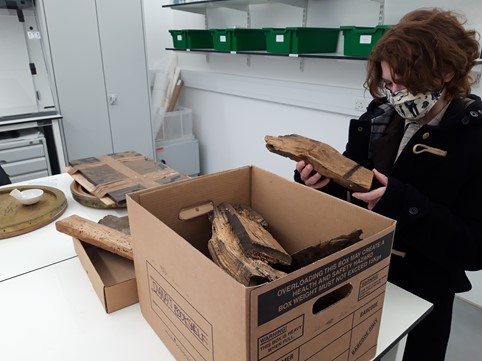From Bioscience to a Forensic Investigation MSc
27/05/2021

When I submitted an application to the Forensic Investigation course at Cranfield during a rare break from writing my PhD thesis last summer, I could never have anticipated that I’d find myself carrying out a research project on one of the most iconic ships in British history. However, that is precisely what I am now doing, researching the activity of wood-decaying fungi on board HMS Victory and investigating the use of nanoparticles as potential antifungal agents.
Having a long-standing interest in naval and maritime history, an undergraduate degree in molecular and cellular biochemistry, and hopes of working in art or heritage conservation, this project feels like an exceptionally fortunate stroke of luck. However, since starting to study at Cranfield, I have come to realise that it’s a natural consequence of the diversity of expertise, backgrounds, and connections represented among the course faculty.
Studying a forensics masters might seem a roundabout route to get into the field of art or heritage conservation, so let me give some background. Although I already had a bachelors/masters and was nearing the completion of my PhD when I applied to Cranfield, all my previous research had been in very unapplied branches of bioscience, far removed from my primary passions of art and history. I therefore wanted a course that would allow me to branch into fields more closely related to my interests.

Solely on the recommendation of a museum conservator, I applied to study at Cranfield, having honestly carried out almost no a priori research into the masters course. This might be the reason it was a surprise to find such a wealth of experience and expertise among the course lecturers, including both faculty and guest speakers, as well as several elective modules perfectly suited to my interests. Those covering Fakes and Forgeries and International Heritage Crime have been, unsurprisingly, high points of the taught course for me, both introducing areas of the art world about which I had almost no previous awareness, and broadening my ideas of potential future career paths.
Mentioning the pandemic is probably requisite for any recollection of experiences over the past year. Due to the various lockdowns and restrictions, most of the course had to be run online. There was considerable potential for this to go wrong, particularly for modules that rely on hands-on activities. However, aside from the almost obligatory sporadic losses of internet connection, accidental muting’s, and troubles with screen sharing, online lectures and even practical’s have run remarkably smoothly. In some modules, interesting workarounds were implemented for practical work, including home delivery of a sort of ‘crime scene in a box’ for Trace Evidence, and a PowerPoint-based virtual crime scene for Hazardous Forensics.
Despite the effectiveness of running much of the course online, I’m relieved that things are now such that the research projects are able to proceed more-or-less hands-on, not least because this has given me the opportunity to visit HMS Victory herself and to meet with conservators working at Portsmouth Historic Dockyard to discuss the project. This is not only extremely valuable from the perspective of my research, but is more importantly an absolute delight to talk with people working in a field I’m fascinated by and keen to be a part of.
To discover more about the Forensic Investigation MSc click here.
Categories & Tags:
Leave a comment on this post:
You might also like…
Keren Tuv: My Cranfield experience studying Renewable Energy
Hello, my name is Keren, I am from London, UK, and I am studying Renewable Energy MSc. My journey to discovering Cranfield University began when I first decided to return to academia to pursue ...
3D Metal Manufacturing in space: A look into the future
David Rico Sierra, Research Fellow in Additive Manufacturing, was recently involved in an exciting project to manufacture parts using 3D printers in space. Here he reflects on his time working with Airbus in Toulouse… ...
A Legacy of Courage: From India to Britain, Three Generations Find Their Home
My story begins with my grandfather, who plucked up the courage to travel aboard at the age of 22 and start a new life in the UK. I don’t think he would have thought that ...
Cranfield to JLR: mastering mechatronics for a dream career
My name is Jerin Tom, and in 2023 I graduated from Cranfield with an MSc in Automotive Mechatronics. Originally from India, I've always been fascinated by the world of automobiles. Why Cranfield and the ...
Bringing the vision of advanced air mobility closer to reality
Experts at Cranfield University led by Professor Antonios Tsourdos, Head of the Autonomous and Cyber-Physical Systems Centre, are part of the Air Mobility Ecosystem Consortium (AMEC), which aims to demonstrate the commercial and operational ...
Using grey literature in your research: A short guide
As you research and write your thesis, you might come across, or be looking for, ‘grey literature’. This is quite simply material that is either unpublished, or published but not in a commercial form. Types ...






